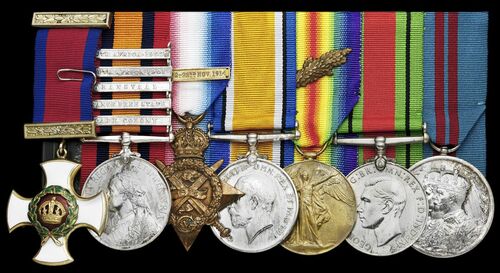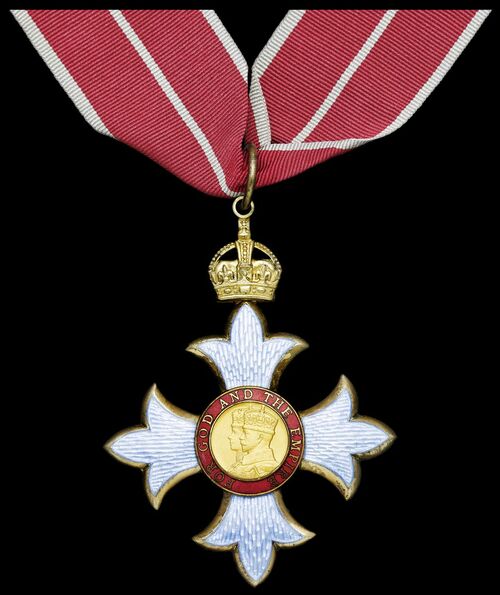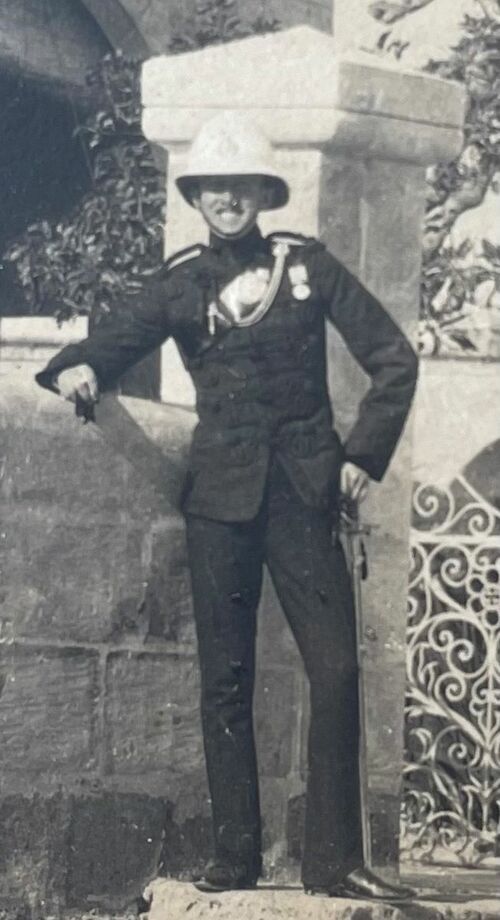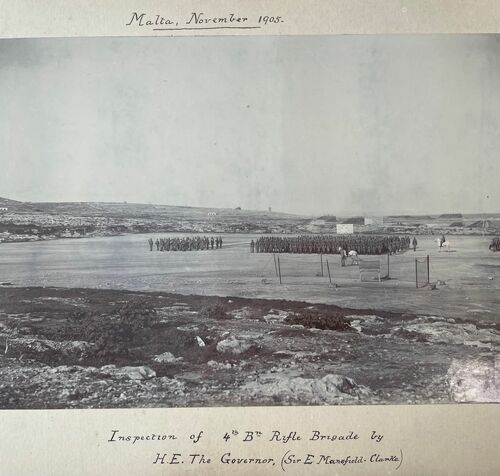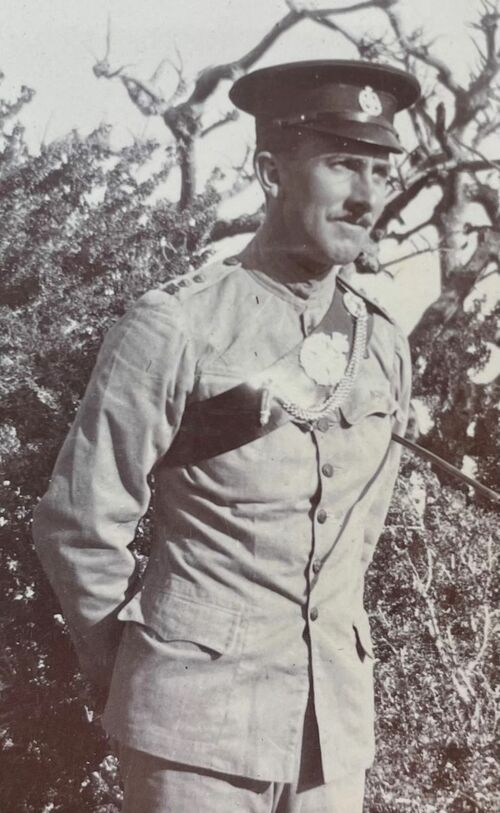Auction: 23002 - Orders, Decorations and Medals
Lot: 99
(x) A fine C.B.E. and Great War D.S.O. group of eight awarded to Lieutenant-Colonel A. J. H. Sloggett, The Rifle Brigade who was made a Prisoner of War on the First Day of the German Spring Offensive, 21 March 1918, when the 7th Battalion - whom he was in command of - was all but decimated; at the Armistice, he selflessly volunteered to travel to Denmark to assist in the repatriation of other Allied Prisoners of War, delaying his own repatriation until 1919
The Most Excellent Order of the British Empire, C.B.E. (Military) Commander's 2nd Type neck Badge, silver-gilt and enamel; Distinguished Service Order, G.V.R., silver-gilt and enamel, top riband bar adapted for mounting; Queen's South Africa 1899-1902, 5 clasps, Cape Colony, Orange Free State, Transvaal, South Africa 1901, South Africa 1902 (Lieut. A. J. H. Sloggett. Rifle: Bde:), the last two clasps contemporary tailor's copies; 1914 Star, copy clasp (Capt: A. J. H. Sloggett. Rif: Brig.); British War and Victory Medals, with M.I.D. oak leaves (Lt. Col. A. J. H. Sloggett.); Defence Medal 1939-45; Delhi Durbar 1911, very fine (8)
C.B.E. London Gazette 1 January 1949.
D.S.O. London Gazette 1 January 1918.
Arthur John Henry Sloggett was born on 4 May 1882, the only son of Lieutenant-General Sir Arthur Sloggett, K.C.B., K.C.M.G.,K.C.V.O. Educated at Harrow and the Royal Military College Sandhurst, he was commissioned into the 1st Battalion, Rifle Brigade on 13 March 1901 and served with them in the Boer War.
Sloggett transferred to the 2nd Battalion in 1911 and served with that Battalion in France from 2 November 1914. He was a Staff Captain 1915-16, G.S.O. 3 1916, and Brigade Major 1916-17. He then commanded the 7th Battalion in France in 1917, being awarded his D.S.O. and earning a 'mention' (London Gazette 21 December 1917, refers) in the process.
Sloggett went 'in the bag' on 21 March 1918 when the 7th Battalion was practically destroyed. Their War Diary reported:
'The enemy opened a heavy drum fire bombardment at 4 am, a considerable amount of gas shells being used. From that time onwards no further communication was received from the forward zone. Runners were unable to get through the barrage.'
By 22 March 1918 the Battalion consisted of 4 officers and 100 other ranks; these were composed of shoemakers, tailors, pioneers, storemen, and the remnants of the Battalion.
The 7th Battalion was reduced to cadre strength on 27 April 1918 and on 17 June 1918 no longer of fighting capacity it was returned to England.
The experiences of Frank Vans Agnew M.C., also held at Fürstenberg Camp, were published in Veteran Volunteer - memoir of the trenches, tanks & captivity 1914-1919 and takes up the story of Sloggett, who volunteered to assist with the repatriation of Allied Prisoners of War held in Denmark:
'On hearing that 12 Officers were needed to go to Copenhagen to help with the repatriation operation Frank volunteered and was accepted. Copenhagen wasn't a vague unknown Scandinavian city, perhaps the capital of Sweden. Allied prisoners of war in Germany were aware that the British Red Cross had an office in Copenhagen. Some had had their first contact with home as missing/pow through this office. Many of the men had received their first Red Cross parcels and subsequently bread from "The Copenhagen Bureau". Also Danish Red Cross officials visited the camps to report on conditions; the Danish YMCA sent secretaries to the camps to do humanitarian work; Danish Bellibria sent books to camp libraries, and the international YMCA had a warehouse in Copenhagen from where parcels could be sent to POWs. Many Danes had, like Dagny, "adopted" a pow. Frank noted down details of all the parcels he received, and we can see that his bread from Copenhagen was on average a fortnight in transit and generally arrived in OK condition. He also received one YMCA parcel from Copenhagen; otherwise his parcels were from his sister Ida in London.
The volunteers for repatriation duty in Copenhagen were to leave on the 9th December and were told that they may be needed for up to four weeks. The latest news for the other POW's in the camp was that they would also be travelling on the 9th but for them it was to be to Copenhagen and on home. Frank wrote in his diary about volunteering that he didn't "regret going to Copenhagen personally, as need some work badly, and glad to help the men", and as he wrote to his sister a couple of days later "it was only fair to let the married men and youngsters go home for Xmas". As it turned out the other POW's had some days yet to wait. Frank and the other volunteers left for Denmark, with no idea what they were letting themselves in for! But what a time they had!
It was hard work but in colleague Lieut. J.D.A. Collier's words they "...enjoyed the hospitality of Denmark for two months…[it was] of such an interesting and unique character", it was in fact a "little adventure". For all but a handful of the homeward-bound former POW's, who succumbed to the Spanish flu, there was to be in Denmark an almost fairytale like ending to their first world war ordeal. James Douglas Archer Collier, AIF. Of the volunteers from Fürstenberg we can identify Frank himself, a 50 year old British born "American 50-year-old with the Tank Corps; Major Walker a friend with whom he shared a mess as POW; Lt. Col. A.J.H. Sloggett 7th Bn. Rifle Brigade; Captain H.E. Milburn 9th Bn. Leicestershire; Lt. Col. Wickermann and two Australians 2/Lt. J.E.A. Stuart and Lieut. Collier from Tasmania. The 12 officers boarded the 9.20 train on 9th December at Fürstenberg, a station on the main Berlin-Copenhagen line. An extra officer was with them: Lt. Col. Lord Farnham. On the train they joined General Ravenshaw, also a former pow from Clausthal camp, who had started his journey in Berlin. These two important individuals were on a fast-track home.
There are further references to Sloggett in the diary of Lieutenant Colonel Charles Howard-Bury deposited in the library of Trinity College, Dublin:
'Early on the morning of April 13th Sloggett and I were warned to hold ourselves in readiness to proceed to Furstenberg. We had only 2 hours' notice in which to pack up and to make all our farewells. We were then given a meal of soup and potatoes, after which we and our luggage were carefully searched and all money taken away from us. This took some time as there were fifty officers coming with us, but when it was finished we fell in in fours outside under a German officer and with an escort then marched to the station, where soon after Midday we entrained in 2nd Class carriages. In most compartments there were seven officers and one of the escort: we luckily had only four, together with the German officer in charge.'
Sloggett arrived back in England on 19 January 1919 whereupon he was posted to the 5th Battalion. He retired to Devon in 1924. He became the Commanding Officer of the 10th Devon (Torbay) Battalion, Devon Home Guard during the Second World War and County Commandant of the Army Cadet Force and played a significant part in its post war reconstruction.
Appointed a Deputy Lieutenant for Devon, he was appointed C.B.E. in 1949 for his work in the Cadet Force. Sloggett was a fine racquets player, winning the Racquet Championship in Poona and becoming army singles champion in 1920. He was also a fine all round cricketer. Colonel Sloggett died at his residence at Paignton, Devon, on 13 December 1950; sold together with a bound photograph album, the cover embossed 'Malta 1906. A.J.H.S.', spine loose, a good number of the images annotated with details of those pictured.
Subject to 5% tax on Hammer Price in addition to 20% VAT on Buyer’s Premium.
Sold for
£2,000
Starting price
£1600

